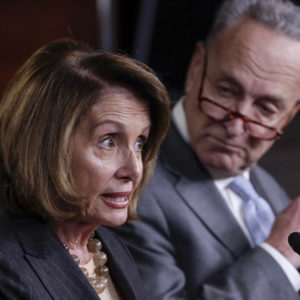Americans’ mistrust of the federal government is near all-time highs, with the Trump presidency further reducing their confidence that government can help address their everyday problems. Voters also hold Congress responsible for prioritizing wealthy special interests over workers and families.
These harmful dynamics undermine the strength of our democracy. Recognizing the fundamental need to fix the system, congressional Democrats have introduced a bold reform agenda to restructure the rules of our democracy — so that the government will fight for economic opportunity for all Americans.
I served as chief of staff to a U.S. senator who narrowly lost re-election in 2014. If I had to do it over again, I would have pushed harder for strong solutions to help make the government more responsive and accountable to voters. Americans would be shocked by a close-up view of how misaligned Congress’ incentives can be — and by the amount of time lawmakers must spend talking with deep-pocketed special interests to raise campaign funds.
Recent polling commissioned by the Center for American Progress illuminates the challenges presented by our current political system. Results show that neither major political party is immune from the public’s ire. The poll also reveals President Trump plays a big role in corroding the public’s confidence in government, due largely to the widespread perception of corruption and illegality in his administration.
Ethical scandals involving several Cabinet secretaries — most notably EPA Administrator Scott Pruitt — prove that Trump is not draining the swamp as he has so often promised. Mick Mulvaney, a former congressman and the head of the Office of Management and Budget, starkly acknowledged that lobbyists had to donate to his campaign to be rewarded with official meetings.
To make matters worse, the Republican Congress’ policy agenda continues to benefit the most powerful and well-connected Americans. Exhibit number one is the 2017 Republican tax bill, which bestowed huge tax cuts on the richest Americans with big giveaways to powerful corporate interests. Some congressional members acknowledged that their donors would stop giving campaign money unless Congress passed favorable tax legislation.
Our Founding Fathers warned of the dangerous potential that our government could become monopolized by special interests that may poison the public’s trust. More than 200 years later, the Supreme Court’s disastrous Citizens United decision has sparked an epidemic of secret and foreign money influencing elections. Our outmoded campaign finance system favors pay-to-play politics over middle-class families, whose voices are further threatened by diminished voting rights and election infrastructure that is vulnerable to hostile foreign nations like Russia.
But there is some cause for optimism. By a margin of 71 to 29 in CAP’s poll, voters say they want a more active federal government to tackle important economic and social problems. And 65 percent of voters believe new campaign finance laws could reduce money in politics so government is more responsive to everyday families, according to a recent Pew poll.
Now more than ever, Democrats must show that they are the party that wants to expand the essential right of every American to have their voice heard and to spur progressive economic changes that will help all Americans. That’s why the time is right to advance the democracy reform agenda unveiled by congressional Democrats, the Better Deal for Our Democracy.
First, the package aims to fix our broken campaign finance system to combat big money influence. This includes policies like ending the harmful effects of unaccountable dark money unleashed by Citizens United and empowering everyday voters via a new system of citizen-funded elections.
Second, the legislation would strengthen our nation’s ethics laws to reduce corrupt self-dealing. This includes reforms like applying ethics laws to all U.S. presidents, strengthening anti-bribery laws, and banning lobbyists from fundraising for members of Congress.
And third, the package is designed to empower voters to ensure responsive government. This encompasses improving access to the ballot box, passing automatic voter registration, ending partisan gerrymandering, and bolstering election security.
Congress could even go a step further by banning lawmakers from raising money from interests under the jurisdiction of the committees they sit on, a CAP proposal supported by 88 percent of voters, including 86 percent of Trump voters.
Voters want lawmakers who show active leadership to reduce the corrupting force of big money in politics and empower everyday Americans. We saw this in the stunning upset victory by Democrat Conor Lamb in the recent U.S. House special election in conservative western Pennsylvania. Polls show that voters were drawn to Lamb’s proactive decision to refuse any corporate PAC money to fund his campaign.
Democratic members of Congress wisely know that pushing for meaningful democracy reform shows they are part of the solution — not the problem.
By combining their new bold agenda of democracy reform with their progressive economic agenda, Democrats will prove their commitment to creating a government that prioritizes fairness and opportunity for all.

